Physical Address
304 North Cardinal St.
Dorchester Center, MA 02124
Physical Address
304 North Cardinal St.
Dorchester Center, MA 02124
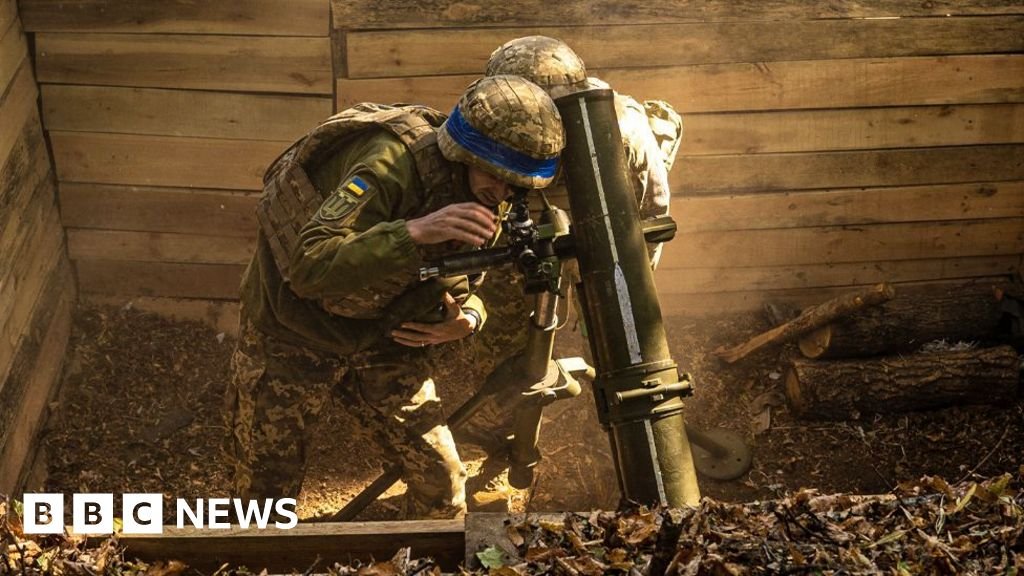
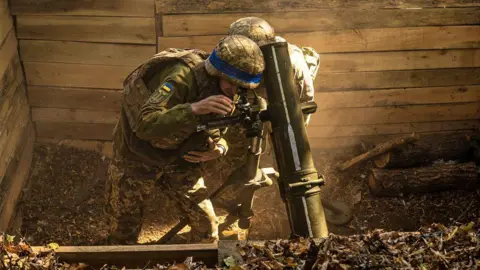 Getty Images
Getty ImagesThe tone is dark, even angry.
“The situation is getting worse every day.”
“We see no purpose. Our land is not here.
Nearly four months after Ukrainian troops launched a blitzkrieg in Russia’s Kursk region, text messages from soldiers fighting there paint a grim picture of a battle they don’t quite understand and fear they may be losing.
We have been in contact via Telegram with several soldiers living in Kursk, one of whom recently left. We agreed not to identify any of them.
None of the words mentioned in this article are real.
They talk about the terrible weather and chronic lack of sleep caused by Russia’s constant bombardment, which includes the use of terrifying 3,000kg rolling bombs.
They are also retreating as Russian forces gradually regain territory.
“This trend will continue,” Pavlo wrote on November 26. “It’s only a matter of time.”
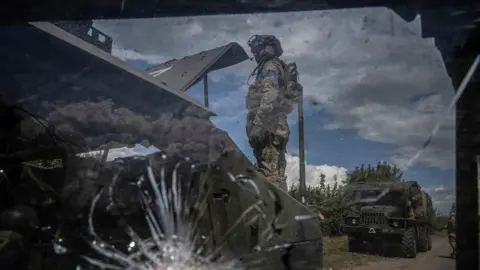 Reuters
ReutersPavlo spoke of the immense fatigue, the lack of rotation, and the arrival of units mostly composed of middle-aged men brought directly from other fronts with little or no time to rest.
Hearing soldiers complain – about their commanders, orders and lack of equipment – is not unusual. This is what soldiers often do in difficult circumstances.
With tremendous enemy pressure and the onset of winter, it would be surprising to hear much optimism.
But the reports we’ve gotten are almost uniformly bleak, suggesting that motivation is a problem.
Some questioned whether one of the initial goals of the operation – to divert Russian troops from the eastern front in Ukraine – had succeeded.
They said the order should now remain with the small Russian territory until a new US president with new policies arrives in the White House at the end of January.
“The main task we face is to hold the maximum territory until Trump’s inauguration and the beginning of negotiations,” Pavlo said. “To exchange it for something later. Nobody knows what. “
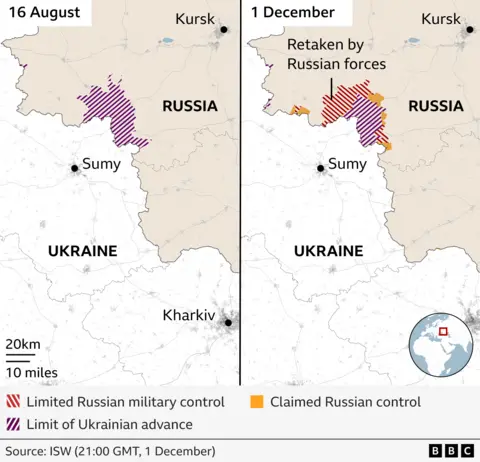
At the end of November, President Zelensky indicated that both sides were thinking about changing the US administration.
“I’m sure he (Putin) wants to push us out by January 20,” he said.
“It is very important for him to show that he is in control of the situation. But he is not in control of the situation.
In an effort to help Ukraine thwart Russian counterattacks at Kursk, the US, UK and France have allowed Kiev to use long-range weapons against targets on Russian soil.
It didn’t seem to do much to improve the mood.
“No one sits in a cold trench and prays for missiles,” Pavlo said.
“We live and fight here and now. And the rockets fly somewhere else.
Attack and Storm Shadow missiles may have been used to great, even devastating, effect on remote command posts and ammunition dumps, but such success seems small to front-line soldiers.
“We are not talking about missiles,” Miroslav said. “In the bunkers, we talk about family and rotation. About simple things.”
For Ukraine, Russia’s slow, crude advance in eastern Ukraine underscores the need to cling to Kursk.
In October alone, Russia was able to capture about 500 square kilometers of Ukrainian territory, the largest since the full-scale invasion began in 2022.
By contrast, Ukraine has already lost about 40% of the territory it seized in Kursk in August.
“The main thing is not to capture, but to hold,” said Vadim, “and we struggle with that a little.”
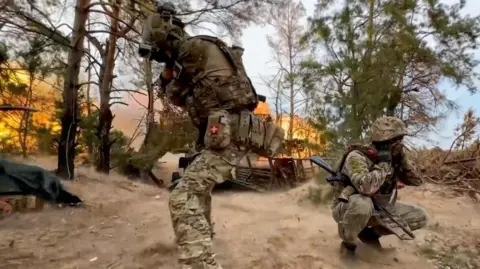 EPA
EPADespite the losses, Vadim believes that the Kursk campaign remains vital.
“It succeeded in diverting some (Russian) forces from Zaporozhye and Kharkiv regions,” he said.
But some soldiers we spoke to said they felt misplaced, that it was more important to be on the eastern front in Ukraine than to occupy part of Russia.
“Our place should have been there (in eastern Ukraine), not here in someone else’s land,” Pavlo said. “We don’t need these Kursk forests where we left so many comrades.”
And despite weeks of reports that 10,000 North Korean troops have been sent to Kursk to join the Russian counteroffensive, soldiers we’ve contacted have yet to encounter them.
“I haven’t seen or heard anything about Koreans, alive or dead,” Vadim said when we asked about the reports.
The Ukrainian military has released recordings of what it says are intercepts of North Korean radio communications.
The soldiers said they were told to capture at least one North Korean prisoner, preferably with documents.
They talked about the rewards — drones or extra vacation — being offered to anyone who successfully captures a North Korean soldier.
“It is very difficult to find a Korean in the dark forest of Kursk,” Pavlo remarked sarcastically. “Especially when she’s not here.”
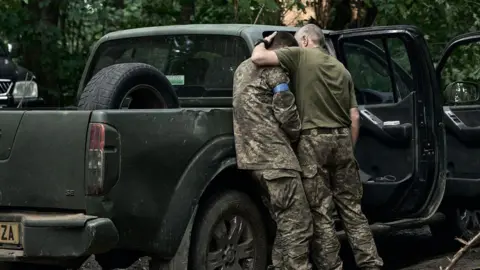 Getty Images
Getty ImagesVeterans of previous doomed operations see parallels in what is happening in Kursk.
From October 2023 to July of this year, Ukrainian forces tried to hold on to a small bridgehead near Krinkia, on the left bank of the Dnipro River, about 25 miles (40 km) upstream from the liberated city of Kherson.
The roadblock, originally intended as a possible springboard for advancing further into Russian-controlled territory in southern Ukraine, was eventually lost.
The operation was very expensive. Around 1,000 Ukrainian soldiers are believed to have died or are missing.
Some saw it as a ploy to distract from the lack of progress elsewhere.
They fear that something similar could happen in Kursk.
“Good idea, but bad execution,” says Miroslav, a naval officer who served in Krynky and is now stationed in Kursk.
“Media effect, but no military result.”
Military analysts insist that despite all the difficulties, the Kursk campaign still has an important role to play.
“It’s the only area where we retain the initiative,” Serhiy Kuzan of the Ukrainian Center for Security and Cooperation told me.
He acknowledged that Ukrainian forces in Kursk were experiencing “incredibly difficult conditions” but said Russia was devoting huge resources to expelling them – resources it would rather use elsewhere.
“The longer we can hold this Kursk front – with proper equipment, artillery, Himars and of course long-range weapons to attack their rear,” he said.
In Kiev, senior commanders support the Kursk operation, saying it continues to reap military and political rewards.
“This situation annoys Putin,” said one person on condition of anonymity recently. “He’s taking a heavy toll there.”
As for how long Ukrainian troops would be able to hold out in Kursk, the answer was straightforward.
“As long as it is possible from a military point of view.”